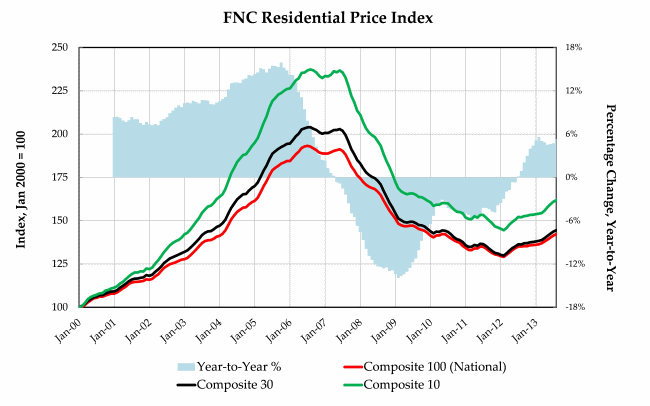With the FNC Residential Price IndexTM (RPI) levels for August home prices have climbed back to December 2009 levels. But the index, while it rose 0.6 percent from the July level, is beginning to display signs of a subsiding momentum.
August represented the 18th consecutive month in which home prices have climbed on the RPI, indicating that the housing recovery remains well underway. However that month-over-month increase was smaller than the 0.8 percent monthly increase in July and 0.9 percent in June. The year-over -year appreciation increased over that of earlier months, gaining 5.3 percent compared to the 4.7 percent and 4.6 percent annual increases in June and July. The FNC 100-MSA composite is based on sales of non-distressed new and existing residential properties in the 100 largest metropolitan areas.

The September median sales-to-list price ratio was also moderated, coming in at 96.2, a 3.8 percent listing price markdown among closed sales, compared to 97.2 in August.
Housing market fundamentals, especially foreclosure filings and the foreclosure inventory, continued to improve and contributed to rising home prices. The share of the home sales coming from foreclosures dipped in August to 12.4 percent from 12.7 percent in July and was more than 4.5 percent below one year earlier.
Nearly all of the major housing markets in the FNC 30-MSA posted price increases in August, but some also showed signs of weakening. Phoenix and Los Angeles had month-over-month declines of 0.1 and 0.4 percent respectively following many months of increases averaging 2.0 percent. Denver, another strong-performer in the current recovery, also suffered a small loss in August.
San Antonio recorded the largest monthly increase, 2.1 percent and Las Vegas climbed 1.8 percent, the 10th consecutive month of rapid price acceleration. Home prices in Charlotte and New York also performed strongly. Chicago, where foreclosures sales made up 21.8 percent of the market in August, prices have appreciated by the smallest amount of any city in the 30 MSA index.
FNC's RPI blends public records of residential sales prices with real-time appraisals of property and neighborhood attributes. The RPI excludes sales of foreclosed homes, which are frequently sold with large price discounts, reflecting poor property conditions.







